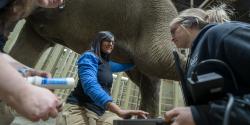So, You Want to be a Zookeeper?
Every year, the Columbus Zoo and Aquarium receives countless questions from students and teachers interested in learning what it takes to become a zookeeper!
For that reason, our animal caretakers have compiled some recommendations on the steps you can take to pursue a career in zookeeping. You can also find some interviews with zookeepers below.
- Animal Nutrition
- Aquarist Zookeeper
- Asia Quest Zookeeper
- Asia Quest Zookeeper, Elephant/Rhino
- North America Headkeeper
- Shores Terrestrial Zookeeper
- Veterinarian
Here are some helpful tips for each stage of your education as you pursue a career as a zookeeper.









